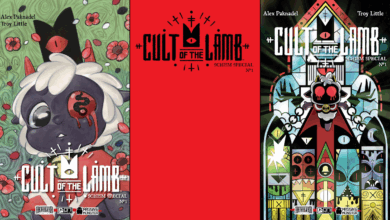Doctor Who ‘Lucky Day’ review: Pete, I owe you an apology

Spoilers for “Lucky Day.”
When the writers for this season of Doctor Who were announced, one name in the roster put me instantly on edge. Pete McTighe may have a distinguished filmography but, in this house, he’s known as the person who wrote “Kerblam.” That’s the Chibnall-era episode summed up as “Space Amazon is great and the people protesting poor working conditions and mass-layoffs are the real villains.” Imagine then, my delighted surprise when “Lucky Day” doesn’t just get its politics right, but it does so with molotov cocktails in hand.
It’s 2007 and the Doctor and Belinda land in London as the clock strikes midnight on New Year’s Day. The Doctor, Vindicator in hand, gets another set of coordinates before realizing a small boy, Conrad Clack, saw the TARDIS land. He hands Conrad a 50 pence piece and tells him it’s his “lucky day,” before the boy sprints back to his mother. But she’s not interested in his story about a magical blue box, striking the boy and saying she’s had enough of his lies.
Conrad next encounters the TARDIS 17 years later when he spots it parked down a dark alley. There's a nearby door with a broken lock and he ventures inside to a closed down department store, where he’s stalked by an unseen monster. After a few seconds, the monster brushes past Conrad, leaving green slime on his neck — which is how it marks its prey. When the creature, the Shreek, emerges into the open ready to strike, it’s zapped away by the Doctor and Ruby.
From the shadows, Conrad watches the Doctor hand Ruby a vial of antidote as she, too, was marked as prey. He stalks them back to the TARDIS and overhears their conversation — half an hour prior, she was hanging out with the Beatles, putting this just after “The Devil’s Chord.” He snaps a picture of Ruby and puts it online, asking the internet if anyone has seen this woman.
He tracks down Ruby at some point after she stops traveling in the TARDIS, and invites her onto his podcast. Conrad tries to flirt with his guest, and a quick montage shows them date and start to get serious about each other. He even confesses he was present during that first encounter with the Shreek, and Ruby hands him a vial of antidote. She says the Shreek, which had tagged him with green slime, was preparing to return to this dimension to hunt him again. But UNIT — the Doctor’s military allies here on Earth — captured it (off-screen).
The pair go to a countryside village where Conrad introduces her to his friends in a quiet pub. But, as night draws in, the lights begin to flicker, and the blink-and-you-miss-it blurs of scary monsters appear outside. One of Conrad’s friends, Sparky, goes missing, and Ruby calls UNIT who leap into action despite no signs of a Shreek incursion. Conrad confesses to Ruby he didn’t take the antidote, wanting to prove to her he was as brave as the Doctor to win her heart.
When UNIT arrives, soldiers face off with a pair of Shreek monsters until they reveal they’re just Conrad’s stooges in rubber suits. Conrad isn’t an innocent caught up in a crisis he can’t comprehend, he’s a conspiracy theorist streamer claiming UNIT is a sham organization. He’s the type to engineer stunts and deceptively edit the resulting footage to smear his targets. I won’t name the real world figures Conrad is inspired by as we’d get angry emails from their lawyers, but I’m sure you can work out who they are.
Conrad’s encounter with UNIT was livestreamed, and there’s another montage of people talking to their generic social media followers decrying the organization. He’s arrested, but quickly released, and given a welcome press tour by the British media, including a favorable BBC News report and a joke on the UK version of The Masked Singer. Conrad even gets consoled during an interview on The One Show — a prime time talk / magazine show — by its real presenter Alex Jones (not that one).
UNIT’s overseers in the UK government and Geneva buckle to public pressure to put UNIT under close scrutiny. As its head, Kate Lethbridge-Stewart says, imagine the fate of the world if any dictator got their hands on UNIT’s arsenal of captured alien technology. Someone senior at UNIT demands the caged (and real) Shreek captured off-screen be removed from London and brought up to the helipad ready for transit. Meanwhile, Conrad has a man on the inside, who has been radicalized into believing his own employers are a sham, who helps him break into UNIT HQ.
Kate refuses to lock the building down, insisting that it’s time the issue was solved once and for all. Conrad, with a stolen UNIT rifle in hand, tries to bait Kate into attacking her on camera with some vicious slander about her father, the legendary Brigadier. Kate is happy the Doctor isn’t here, since he won’t stop her from doing what the audience has been demanding she do for the last few minutes. She opens the cage holding the Shreek and lets it go for Conrad.
Like all two-bit bullies, Conrad crumbles in the face of real danger and starts begging for mercy but Kate refuses. Sadly, Shirley hands Ruby a taser, which she uses to knock out the Shreek before it can bite Conrad’s head off. Now that his life has been saved, Conrad goes back to playing up for the livestream, boasting that UNIT’s “special effects” have gotten better. At which point the Shreek wakes up and bites his arm off.
There’s a sharp cut, and next we see Conrad waking up in a prison cell with a contraption around his arm, presumably keeping it joined to his elbow. Suddenly, he hears the TARDIS noise and is brought aboard for the Doctor to tell him that he’s a bitter, sad person who will die in prison. But Conrad is unrepentant and says he “rejects” the Doctor’s “reality.” After he’s returned to the cell, he’s visited by Mrs. Flood, who confirms what he saw was real, and that she’s letting him free as it’s his “lucky day.”
It does appear as if I owe Pete McTighe a fulsome apology and must assume he isn’t at fault for all of the reactionary politics of “Kerblam.” “Lucky Day” is both a worthy sequel to “73 Yards” and a sign that, if Doctor Who is just weeks from an enforced hiatus, then it’s going out swinging. It’s got a lot of targets, including the BBC’s habitual reputation-laundering of unsavory characters. The notion of who is in “the wrong” is made explicitly clear here, too, and Conrad occupies the same political (and narrative) circles as Roger ap Gwillam (Albion TV gets a reference).
Like a lot of this year’s run, the episode feels like an overstuffed script which was then cut down to fit a specific runtime. But the structural work underpinning things feel more solid here, so while a lot of the connective tissue is absent, it’s not to the detriment of the story. Kate’s decision to unleash the Shreek may have been well-telegraphed but it’s better than the solution appearing out of nowhere because there’s five minutes left to run.
There’s an element of the show playing to its strengths, and the genre savviness of its audience here as well. If you know the beats of a girl-meets-boy romance movie, then you’ll spot this is a cracked-ish mirror version of that. And we don’t need much evidence of Conrad’s villainy — calling the Doctor, UNIT and Kate a bunch of frauds to make money from his online audience — since we know they are our heroes. Plus, anyone who slanders Brigadier Lethbridge-Stewart, after all, deserves to get what’s coming to them.
“Lucky Day” is smart about how it introduces us to Conrad, too, giving us obvious red flags from the get-go. Adult Conrad has no reservations about taking a picture of a stranger and sharing it online for the internet to identify on his behalf. There’s a hint of judgment in how he asks about her relationship to and with the Doctor, mirroring the way Alan Budd flirted with Belinda in “The Robot Revolution.” In fact, it’s an interesting counterpoint to that episode, since we get enough time with Conrad early on to learn to at least be wary of him, rather than it being a fairly unsupported third-act twist.
If there’s one downside, it’s that the episode leans on the trope that survivors of abuse perpetuate that cycle of abuse. Conrad gets hit in the head by his mother and while it’s hard to assume a pattern of behavior from one scene, it didn’t seem like it was the first time. Much as we saw in “Lux,” there are limits to the storytelling possibilities inherent in a series about an immortal science clown traveling anywhere in time and space in a blue box.
This episode is also focused on Ruby’s post-TARDIS life, which has left her in a vulnerable position. As she admits at the end of the episode, her time with the Doctor was spent in a constant state of panic and peril. She’s tired, she’s alone and the first man she tried to form a relationship with turned out to be using her. That’s bound to leave a scar, but the after effects of a trip in the TARDIS is rarely discussed in the context of the series itself. The majority of the classic series' companions lacked detailed interior lives, while modern day ones often move on to other “exciting” things rather than back to a normal life.
Mrs. Flood Corner
It does appear as if the structure of the series isn’t just Russell T. Davies relying on a familiar rhythm but something more deliberate. “Lucky Day” is the fourth in a row that shares themes and elements with the same numbered episode in last year’s lineup. It’ll be interesting to see how much of next week’s “The Story and the Engine,” and the following week’s “The Interstellar Song Contest” shares with their counterparts from the first series.
It’s plausible that the time fracture that was featured in “The Robot Revolution” has, somehow, knocked the series off its previously-planned course. That either within the show’s fiction or in its metafiction, we’re explicitly seeing parallel versions of those previous episodes. If you recall from that episode, too, the Doctor says he was told to meet Belinda by an unknown person. What if he was chasing down Conrad’s lead, and if so, would that be enough to create a paradox (even if the TARDIS can avoid such obstacles)?
Then there’s the fact Conrad says he explicitly rejects the Doctor’s “reality,” which feels like a telling way of wording things. Especially as this season’s two-part finale is titled “Wish World” and “The Reality War,” although that title is hardly a massive clue. After all, last season’s finale was “Empire of Death,” as opposed to “The one in which it turns out Stuekh has been clinging to the TARDIS roof for God knows however long.”
I’m not sure I want to read too much into Mrs. Flood releasing Conrad since that, like last week, could simply be a topper to the story. It may be that she’s simply letting him out to wreak more havoc and undermine UNIT and the Doctor’s goals rather than anything specific. Not to mention that if Mrs. Flood is a dimension-surfing entity hell-bent on destroying the Doctor, she’s hardly going to have much use for a schmucky YouTuber.
This week, the BBC announced that “The Reality War” would not be getting its customary early in the day stream online. Instead, it’ll hit the iPlayer and Disney+ at the same time as the UK broadcast, and both episodes are being lined up for a small cinema release. That’s reserved for big event episodes, and it adds more weight to the rumor Gatwa has already left the show. Not to mention he’s starring in the play Born With Teeth from August 13 through November 11 — which would prevent him from shooting a season for 2026.
Outside the mystery box elements of the show, this season feels as if it’s having a meta conversation with itself. “Lucky Day,” for instance, takes a similar premise as “Love and Monsters,” a Doctor-lite episode focusing on one of the so-called ordinary people who are peripherally involved in the Doctor’s adventures. Conrad is initially presented as one of the lost souls who are drawn to the Doctor — you could almost describe them as fans — but who don’t shine brightly enough to get the Time Lord’s special attention.
Oh, and I can’t think of any reason beyond silly fan service that Conrad’s streaming outfit is called “Think Tank” beyond a deep cut nod to 1974’s “Robot.” After all, there’s almost nothing in common between the two entities and their goals are ostensibly in conflict.
This article originally appeared on Engadget at https://www.engadget.com/entertainment/tv-movies/doctor-who-lucky-day-review-pete-i-owe-you-an-apology-190037017.html?src=rss
Source link






